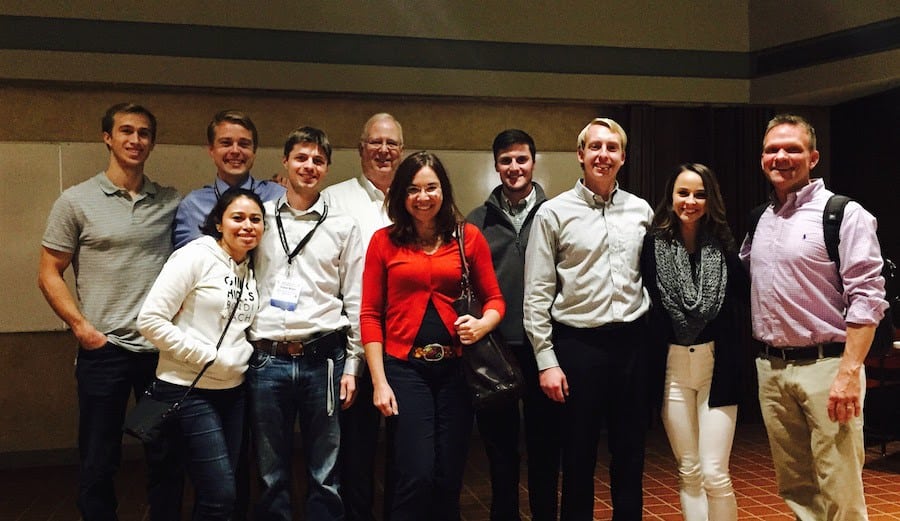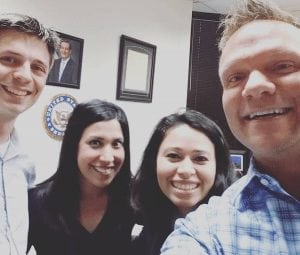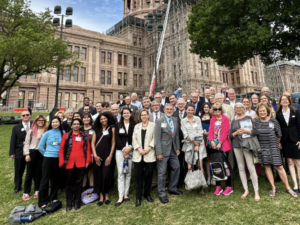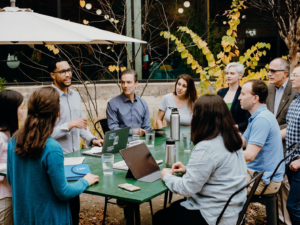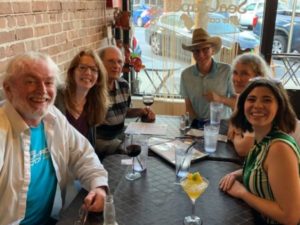Dr. Katharine Hayhoe (center, in red) was there for the launch of the new CCL chapter in her hometown of Lubbock, Texas. By Alex Amonette CCL volunteers Peter Bryn, Sandy Pinto, Ricky Bradley, Larry Kremer, and Brett Cease just concluded a successful 29-day, 30-city “Texas Energy Freedom Tour!” The group held 71 events: 25 public presentations primarily to identify new group leaders, and 46 meetings with various community leaders including Chambers of Commerce, county Farm Bureaus, mayors, newspapers, faith leaders, and Republican County Chairs. Along the way, CCL groups were launched in Lubbock (home to Dr. Katharine Hayhoe) and Houston-Northeast. Groups are now also in process in Corpus Christi, Laredo, Alpine and Wichita Falls. Peter said, “The idea for the tour started in June at the national CCL Conference in our state planning session. We needed to grow in the state and build political will. We had eight chapters at the time in our four big cities. We decided to do a big road trip.” The tour was financed by fundraisers, “Go Fund Me” and volunteer contributions of time and money. In August, Peter, Ricky and Brett determined who they wanted to reach out to. “We were focused on making this a tour that encompassed nontraditional allies and coalition partners,” said Brett. From left, Peter Bryn, aide Casandra Garcia, Sandy Pinto, and Ricky Bradley in the office of Sen. Ted Cruz. Peter looked at Volunteer Match and the existing CCL database to see where our volunteers were already located. Then he looked at congressional districts where CCL did not have a strong presence. “It turned out to be about 12 Congressional districts, exactly one-third of the Texas delegation. Then we linked almost 30 cities that passed through these various districts. We had at least one big event in each of the cities from October 4th through November 1st,” said Peter. Twenty volunteers spent two months setting up appointments and scheduling meetings. “Most of the volunteers doing the scheduling were talking with people with whom they already shared common ground,” said Ricky. “I think that was the key to us getting so many presentations.” They held twice weekly phone calls and used a Google Excel planning sheet to keep organized. “Once we had baseline details set up, rather than working forward, we worked backward,” said Brett. “We saw the deadline as the goal. We figured out what needs to be done two weeks beforehand so that we weren’t caught with any surprises at the last minute to meet that deadline.” “The best ‘Ah hah!’ moment,” said Ricky, “was with a county judge, who is a former Marine and the local Farm Bureau president. After introductions and some pleasant exchanges, he said, ‘Windmills use more energy than they create, and they kill birds.’ Now, judges believe in accountability. We said, ‘You’re right, if these things are happening and they kill birds they should be held accountable. Just like all fuels should be held accountable for their costs.’ By the end of the conversation, he said he’d like for us to come speak at their Annual Meeting in Austin of all the Texas Farm Bureau presidents.” For Peter, “The best conversations were with the Chambers of Commerce. They were the most engaged and most interested.” Ricky added, “Chambers of Commerce are about diversifying their local economy. They are there to support and strengthen the industries in their district, but they are also there to create more local resilient economies. Conversations we had about the dividend coming back to their local economy versus going to an oil and gas major in Houston resonates with them. Because they understand this is money that stays locally. In one town where 40 percent of their revenue comes from a coal-fired power plant, we discussed not shutting that plant down, but alternatives. Can it be converted to a natural gas or a cleaner burning facility? All of the engineering expertise that we have in this state should be put to use, and no one should be put out of a job.” “West Texas is pretty empty,” said Larry. “We drove 4-5 hours between towns, through heaviest oil production areas. In one county, 75% of jobs are oil related. I worked in oil and gas. I’ve been an active member for a year and a half and a member of CCL for a couple of years before that. I am a scientist. The Chambers of Commerce got all excited talking to us. It’s a conversation. Once you have done one or two of the meetings, you learn to play off each other. You can contribute from different directions.” A president of a county Farm Bureau said something along the lines of “God has more control over climate change than we ever will.” Sandy said, “Speaking as a Christian myself and not on behalf of CCL, I feel it’s our responsibility to take care of this earth. Life is a gift from God and so is this earth. It’s irresponsible to say God will fix it and clean up our mess.” This resonated with the Farm Bureau insurance agent also present, and he said so. He looked moved.” Ricky said, “Farm bureaus had good questions, one of which was, ‘OK, you’re telling me about climate change, well, how bad will climate change be?’ That offers us the chance to continue with the next step and find experts in Ag in Texas who can help speak to that and answer their questions.” Peter’s presentation mimicked Bob Perkowitz of ecoAmerica, 13 Steps and Guiding Principles on speaking climate. “Make it local, make it relevant. Acknowledge ambivalence. Acknowledge the discussion is not settled, although the science community is in agreement. Start and end with people.” “There will probably have to be a Texas Tour 2. It’s so important to build relationships and follow up. This is really just the beginning of a process,” said Peter. Ricky said, “Our message works! It’s never been more apparent to me that our methods and message works!” “Put your pre-conceived notions aside,” said Brett. “Try to find common ground and look for the best in everybody.” To those in CCL thinking of doing a similar tour, Peter says, “Go ahead and do it! There certainly is nothing to lose and: (1) make sure you have time to commit to planning and doing it; (2) figure out what will work best in your state and what your objectives are, such as growing groups and talking with community leaders. I’m happy to talk with anybody about what we did and help you figure out your tour”. “This is it’s the most impactful thing I have done since I joined CCL,” said Ricky. Thank you! A heartfelt thank-you to Dr. Katharine Hayhoe and all of the volunteers who worked on this tour – Alex Amonette , Jeff Baker , Jon Beall, Ricky Bradley, Bill Bray, Peter Bryn, Brett Cease, James Coan, Carol Denson, Montserrat Encontra, David Gonin, William Henning, German Ibanez, Matt Kovalski, Larry Kremer, Sam Mansfield, Cole McNiel, Rosella Pena, Sandy Pinto, Jim Rine, Melissa Ruof, Jordan Vogel, Gregory Thackston, Ron Spross, Matt Weldon, and Douglas Yazell. Alex Amonette is a member of the Tri-Cities, Washington, CCL chapter and a volunteer blogger for CCL. Peter and Brett developed a list of 20 volunteers (both in and out-of-state), timeline, set the dates and figured out the route. Peter organized a user-friendly Google SpreadSheet for planning the meetings and events. This tool can be edited and shared live online by volunteers. It provided a centralized place where Peter and Brett could see where progress was being made and where they needed to follow up with volunteers who were having issues or had questions. (Tip: it worked better on Google Chrome, not Internet Explorer). They used Uberconference for twice-weekly, free conference calls to troubleshoot questions and concerns. During the tour, Peter says, “There were, at any given time, three of us crammed into my Saturn. We were true to the itinerary. Once events became confirmed, I transferred those into calendar invitations in our shared Google Calendar. All of us had the Google Calendar on our phones so we all knew where the event was. It helped make sure we had enough time to travel between the events. We booked hotels a day or two in advance of each stop.” For further information, contact Peter Bryn ().On the road with CCL’s ‘Texas Energy Freedom Tour!’
Mapping the Tour and Planning Meetings/Events
Tour Highlights
Major Takeaways
Tour Logistics
Posted on November 4, 2015 in Grow the Grassroots

